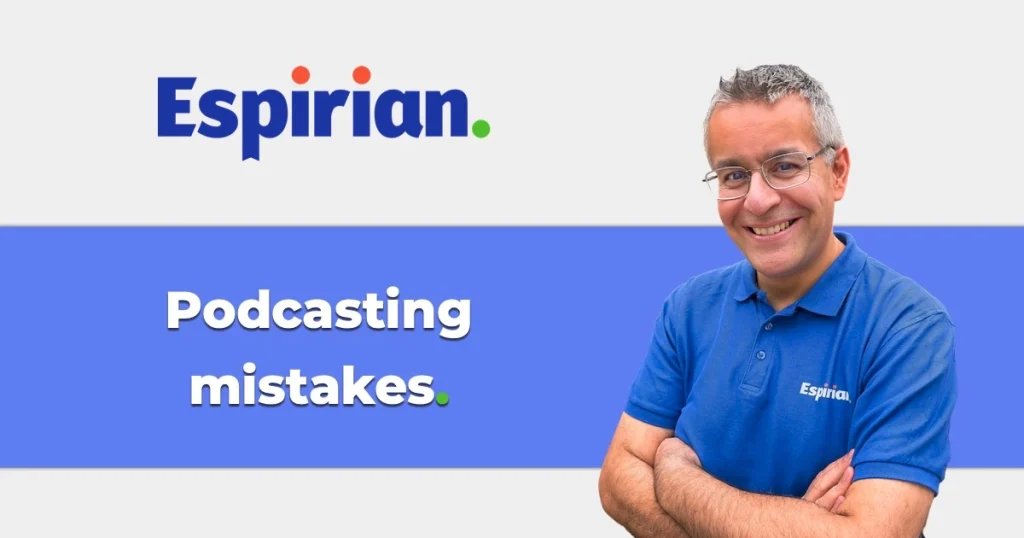This was prompted by a popular LinkedIn post on mistakes by podcasters and their guests.
A blog post about podcasting wouldn’t be complete without a bit of audio, right?
Introduction.
I’ve been an avid listener of business podcasts for more than a decade. This blog sets outs some of the bad practice I’ve heard across countless hours of podcast consumption.
I’m focusing here on audio podcasts where a host interviews a guest. (Livestream videos that are repurposed as podcasts and other solo shows are separate topics.)
Full disclosure: I run my own private podcast for members of my Espresso+ community. It’s not an interview show but rather an audio copy of the premium content in our private video library.
I’ve been a guest on 60+ podcasts. Feel free to critique my performances here: John Espirian’s guest podcast appearances.
False promises.
Podcast titles matter. It’s a real let-down when the content of the conversation doesn’t live up to the promise of the title.
The title is set after the conversation has taken place, so the podcast host is in full control of how the episode is positioned. There’s no excuse for clickbaiting your listeners!

Lack of research.
Guests should never have to tolerate a host not knowing how to say their name, or not knowing exactly what they’re all about.
A podcast is not a discovery call.
Hosts should do their research rather than simply reading out a guest’s bio from a script.
Honourable mentions here for two of the best podcasters I know for doing their homework on their guests: Billy Samoa Saleebey and Douglas Burdett.

Boring questions.
Ask the stuff that we couldn’t easily look up on Google.
We want real insight, such as understanding why someone holds a particular position on a topic.
Or perhaps we’d benefit from understanding the behind-the-scenes elements of how they implement an idea.
Boring questions lead to more of what we’ve already got – and no one needs that.
Interesting questions leads to interesting answers.

Not listening.
Too many hosts ask a set list of questions but don’t listen and respond meaningfully to the answers given by their guests.
When I hear things like this, I feel that the host is just getting through the interview so that they can publish yet another piece of content that supports their SEO empire building.
Maureen McCowen.
One of the most frustrating experiences I had as a guest was where the host stuck rigidly to a list of prepared questions. There was no flow to the conversation, no link between the topics. As a guest, I felt unheard. As a listener, I would have switched off.
A good conversation is often characterised by one party echoing what the other has said, to ensure that the message has been understood. (This goes beyond the remit of podcasts.)

Laughing at your own jokes.
The listener will be the judge of whether you’re funny. Get to the point.
Also, when a host and the guest share in-jokes on air, that can exclude the audience.
If your audience won’t get what you’re saying, don’t put it in.

Self promotion.
If you’re a host, don’t “overseason your food”. (My version is: “put less sodium on your podium.”)
Showboating is a turn-off, and we don’t need to know every little achievement you’ve made.
Make the guest the main focus of the show. If the content is good enough, listeners will trust you both.
Remember that the aim for host and guest is to provide something of value to the listener.
Ultimately, the show means nothing without its listeners.

Misunderstanding the knowledge of the listener.
Stop using obscure acronyms and assuming too much knowledge unless you know you have an expert audience.
“No one ever complained that things were too easy to understand.” – Ann Handley

Not giving credit where it’s due.
All ideas are derivative to some extent but here’s a good reminder about making appropriate namechecks:
Kevin D Turner.
Don’t intentionally use other people’s brand messages or concepts like they are your own to impress the audience without properly mentioning where and who it comes from.

Going off topic.
A podcast episode’s theme should be clear in the headline and the show notes, to respect the listener’s time.
Wandering off topic may lead to some interesting conversations but unless that’s explicitly part of the deal in the value proposition of the podcast, it’s best to stick to the subject.
Daphne Gordon.
Why would I listen to a 25-minute convo on a very general topic or five different topics with someone I’ve never heard of?

Poor show notes.
Podcast show notes are often lacking.
They ought to give listeners enough information to understand the key points about each podcast episode, along with appropriate external links.
For very long episodes, it would be ideal to see time stamps in the show notes, to make it easy to jump to relevant parts of the recording.

Too many ads.
I’m not totally against ads on podcasts but some hosts overdo how many sponsored spots they have.
Selfishly, I prefer to see any ads at the start of a podcast, so that I can skip through to the good stuff.

I like the earnestness with which Lex Friedman handles this.
He usually starts with several minutes of ads but tells listeners that they don’t need to listen and can skip ahead. (We don’t need that permission but the way Lex says it makes me want to check out the ads occasionally.)
His opening to episode 389 is a lesson in earnestness.
No episode numbers.
This one is admittedly a minor issue, but if podcast hosts expect us to promote any episodes, then it really helps if those episodes are clearly numbered.
Some shows are separated by seasons. That’s fine but again they could do with a numbering scheme, such as “Season 5, episode 7”.
Anything that makes your content easier to reference has to be a win for all concerned.

No transcripts.
Audio podcasts aren’t well set up to present a text transcript of the content being spoken. But unless hosts make an effort, their podcasts become inaccessible to those who can’t hear the audio.
If you have a website for your podcast, each episode page could include a full written transcript. There are also other third-party services that can offer this.
I put the transcripts for Espresso+ sessions on Google Documents.

Poor audio quality.
This one applies to all podcasts, not just interviews.
The post-pandemic consumer doesn’t expect Hollywood-level production. But if they’re going to have something plugged into their ears for half an hour or more, the audio standard needs to be decent.
Even a cheap microphone would do, and a quiet recording environment helps.
On a related note, a bit of light editing is also a good idea. We don’t need to hear 30 seconds of typing while one of the participants looks something up. Respect the reader’s ears and their time.

Podcast hosts and guests can use the free, browser-based Adobe Mic Check service to see whether their audio setup is up to scratch.
Let’s wrap up.
These were some of the things that lead to a bad listener experience for consumers of podcasts. No doubt there are more.
Number one tip for podcasters: ask yourself whether your listeners will approve of the decisions you’ve made in structuring and delivering your shows.
If they don’t like it, you shouldn’t do it.
If you’re a prospective podcast guest, check out how to be a good podcast guest.






